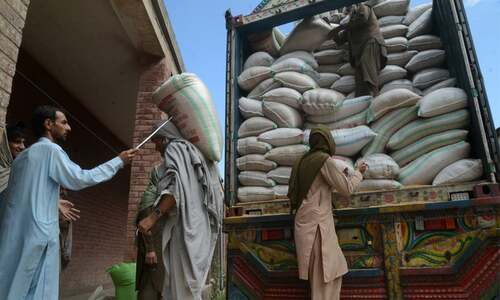Much has been exposed, written about and debated in the last 10 years on Pakistan's failing education system. A recent appraisal has been done by Sir Michael Barber, co-chairperson of the Education Task Force, initiated jointly in 2009 by the UK and Pakistan governments. His report is interestingly entitled “Education Reform in Pakistan This time it's going to be different”. Sir Michael has spent time in Pakistan and met with both the representatives of the public and private sector in education first hand and then formulated his perceptions and solutions to Pakistan's education ills. Assisting him as co-chairman is the present government's Minister of State Shahnaz Wazir Ali.
Sir Michael Barber's credentials as a reformer are well-established in Britain where he assisted Tony Blair's Labour government between 1997 and 2001 to bring in an ambitious school reform programme. As chief advisor to the Secretary of State for Education, he was instrumental in carrying through successful programmes to improve literacy and numeracy at primary levels, support and uplift failing schools and do away with redundant local education authorities.
Earlier, as a Professor of Education at London University's Institute of Education, he authored publications such as The Learning Game Arguments for an Education Revolution (Indigo 1997), How to do the Impossible A Guide for Politicians with a Passion for Education (Institute of Education, London 1997) and The Virtue of Accountability (Boston University 2005). Needless to say, his advice has been sought by international organisations including Organisation for Economic Coorperation and Development (OECD), World Bank and International Monetary Fund (IMF) on policy matters and on education by countries as diverse as Australia, USA, Russia, Hong Kong, Estonia and Chile. The Task Force was initiated a year ago to assist Pakistan's leaders in rectifying, improving and creating a successful education system which the people of the country wish to achieve. It will, perhaps, be Sir Michael's most daunting task although there are examples elsewhere in the world where success has been gained with conditions as bleak as that of Pakistan. According to him and reiterated often by others, Pakistan's ailing system has the following characteristics
• One-third of primary-age children, a larger proportion of girls than boys, are not in school at all.
• Around 35 per cent of those children who do attend school and make it to grade three, cannot do single digit subtraction.
• For every 100 children that start school in kachi (kindergarten) class, just one will make it all the way through school to grade 12.
• Each day around a quarter of the country's teachers do not turn up at school; each day, many thousands of schools that could be open are not — they are called “ghost schools”.
• School facilities are very poor — 60 per cent have no electricity and 34 per cent no drinking water.
• The low-cost private sector delivers better performance than the public schools at less than half the unit cost.
• Karachi, a city of around 17 million people and over four million children of school education age, has just 600,000 children enrolled in public schools and around 1.5 million more in low-cost private schools — which suggests that as many as two million children are not in school at all.
Michael Barber sets the tone for Pakistan's focus on educating the bulk of its populace as soon as possible by quoting the Quaid on the crucial importance of education for Pakistan. “Education is a matter of life and death for Pakistan. The world is progressing so rapidly that without the requisite advance in education, not only shall we be left behind by others but we may be wiped out altogether,” said the Quaid on Sept 24, 1947. Already the Quaid's prophetic pronouncement is gaining ground. 2010's global economic crisis has caused the Pakistani leadership to recognise that the school system in Pakistan is deeply dysfunctional and provides no opportunity for advancement. To survive globally, Pakistan's economic prospects depend upon greatly improving the school system at all costs and making access to quality education a reality.
Education Task Force's report by Michael Barber is very clear on how it wishes to carry forward the reform. Firstly, a sustained political will is necessary to carry through the reform effort. From one government to the next, the will and pace of reform must be sustained at all levels for a whole decade for results to appear. Second, the “narrative of reform” has to be often repeated publicly explaining “why reform is necessary, what it could mean for the country, what progress has been made, and what lies ahead.”
The narrative entails the creation of Pakistan and its independent political entity; the remarkable civilisations that existed along the Indus River one of them being the Mughal Dynasty and the presence of one of the world's religions, Islam, that contributed to world civilisation in areas of art, scientific discoveries, literature and history and profound insight into how life should be lived. All these must continue to inspire the leadership and the people to make Pakistan economically, socially and politically secure through education.
For all of this to happen Sir Michael puts forward a “seven key strands” reform strategy from the National Education Policy, 2009. He uses the term “pressure and support” for initiating reform across the board with pressure directed at formulating clear standards for all students whether studying in Urdu, the mother tongue, English, Mathematics or Science and similar standards for “good schools” across districts and provinces. Third, pressure from an all-Pakistan national public advocacy campaign that should keep pressurising the hierarchy in political and education circles to bring in the change. And lastly, continuous reportage of provincial and district reviews be published to keep track of the change process.
Support measures focus on teacher education and improving their skills to teach the curriculum. This will require high-quality professional development with high-quality textbooks and curriculum materials to enable the teacher to teach each lesson well. Despite NGO efforts, the majority of students will still be in the government or public school sector and support for capacity building of all public schools across Pakistan has to be planned and executed with rigour. The challenge of reform as stated by Sir Michael is not a lack of ideas or experiments but one of scale and capacity to deliver.
For most Pakistani educationists and activists, the problem of scale and capacity to deliver has been the ongoing narrative for change that has not borne fruit so far. In an interview, Sir Michael was asked about what he thought had been the biggest challenges of reform. His answer to that was and I quote verbatim “The implementation challenges have to do with scale and speed. A lot of government programmes start off with a good idea, but as they go through the bureaucracy and out into the system, compromises are made, and by the time it gets to the actual frontline, it is so watered down that it doesn't work. Then the frontline tells you the idea was bad when, actually, there was nothing wrong with the idea, just the implementation. You need to be very conscious of what you're doing and how you're doing it, and you need to design mechanisms to make sure that the programme is faithfully implemented.”
Implementation is then at the heart of a successful reform. However, the core of the problem not mentioned in the report is that the National Education Policy is silent on an implementation strategy and a clear policy on language and medium of instruction. Here the Task Force can apply pressure with the various donors and Pakistan's parliament to fix a policy for language which impedes any reform effort. A detailed strategy is needed here to address the mess created by a dual language policy operating in schools across the country.
Furthermore, the Education Task Force will need quality human resource management to bring in change. This gap in the report is worrying because unless massive training on a large scale is not done to bring in educators to see the reform through, the possibility of success is dismal. Quality begets quality and the challenge of reform in Pakistan lies here. Quality educators will also be able to reduce the state of corruption because they will be confident in their ability to perform.
Here it might be judicious to mention another Campaign for Quality Education (CQE) working paper titled “Education in Pakistan The Nickel and Dime Route to Ruin” by Irfan Muzaffar. This author cautions that the approach to social justice, equity and access is not through low-income private schools which Sir Michael's education strategy promotes. The author's contention is that low-income private schools are “unlikely to mitigate the sense of social and economic deprivation in which the clientele they are presumed to serve is already caught up.”
Moreover, the education inequities in Pakistan's context will further cause the divide to increase between the small elite and the mass of population who are deprived of any worthwhile access to jobs in the labour market of today. Accordingly, the belief in an equitable public school system to strengthen democracy might be reinforced by the findings of this paper.
The way forward for any reform in the education sector has to be made visible in a detailed implementation document which the Task Force can be motivated to put together and make public through the media. Right now the report is only on paper and the skeptical among the activists would like to know exactly what is going on and how it has been accomplished. Till then, it just might find itself as one of the myriad reports compiled in the last decade, which never saw the light of a successful change or reform in the education sector.
The writer is an educational consultant based in Lahore.











































Dear visitor, the comments section is undergoing an overhaul and will return soon.